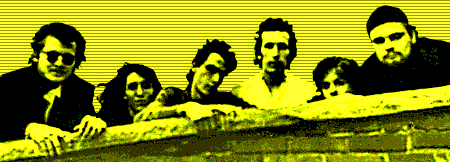|
Upon returning from their Midwest tour, The Dancing Cigarettes agreed to talk with me about their experiences, their goals, and the music they create. Each member spoke enthusiastically about the tour and commented on the wide range of receptions they received. Lamenting the negative reactions, Michael Gitlin maintained that The Cigarettes play "pop music. That's really what it is. It's just a little different." That "little" difference, however, is the fundamental quality that lends the band its distinctive sound. To understand that difference is to understand The Dancing Cigarettes.
While I was attending a composer's forum some time ago, the perennial question, "For whom does the composer compose?" arose. Although I always thought of this as a ludicrously academic issue, I soon found that it is a much greater dilemma than one would assume. Most composers suffer the unfortunate fate of familiarity with music's more modern sounds and stylizations. As familiarity frequently breeds satisfaction, it naturally follows that many composers find esthetic fulfillment within the range of the contemporary aural (musical) vocabulary.
For those composers who are plagued with a pioneering spirit, their pleasure is greater when they exceed the boundaries of the current musical domain and succeed in unearthing new sounds and / or compositional techniques. What has long been a struggle between composers and the potential listening audience for the acceptance of new music is basically a derivation of the commonly held axiomatic condition: that which is familiar is generally accepted, and that which is unfamiliar is generally unaccepted.
This unresolved dilemma also occurs, although much more infrequently, in the genre of pop music. By its very nature, pop music is characterized by simple harmonies, steady rhythmic patterns repeated with great regularity, and constant and immediate fulfillment of the listener's expectations. Occasionally, however, pop artists drift out of this restrictive domain. As with conventional ("classical") artists, the excitement of exploration can lure pop artists into the dark realms of atonality, polyrhythm and dissonance.
With disturbing predictability, American pop music responded to the glaring lack of creative innovation in the early 1970s by enthusiastically taking up the banner of England's "New Wave" rock and carrying the music stateside. The result fell disappointingly short of its potential. The political and social thrust of England's music was sorely missing in the American counterpart, and evenually this "New Wave" syndrome became synonymous with saccarine, reactionary nostalgia-rock.
From America's heartland, however, have come bands that are interested in challenging the status quo and exploring new musical horizons. Such music is most often found on small, unknown labels whose distribution is usually limited to local merchants. Thus, due to the compounded difficulties of "inaccessible" music and poor exposure, few of these bands succeed in familiarizing themselves with their potential listeners and therefore are generally misunderstood, disliked or completely unknown.
In this instance, pop artists share with conventional artists the plight of having to create their art primarily for themselves and their colleagues. Although this condition is far from a desirable resolution to the esthetic dilemma, it does catalyze the development of such exploratory music into refined, well-crafted art forms which, history has demonstrated, may eventually gain recognition and acceptance from the listening public. Poised in this dubiously honorary twilight-zone of convoluted esthetics is The Dancing Cigarettes.
Comprised of a relatively standard instrumental line-up, they undauntedly explore alternative methods of instrumental performance. Timothy Noe wrenches clusters of clamorous beauty from his electric organ. Noe and fellow reedman Don Trubey elicit screams of agony that disturbingly resemble the human voice. In the rhythm section, the crisp, terse drumming of John Terrill is delightfully offset by the loping bass lines of Emily Bonus, who admittedly designs her bass parts by the redeeming value of their geometric patterns on the finger board. Playing a variety of metallic objects and synthesizer, Jaclyn Oddi conjures clangorous exoticisms that complement Trubey's understatedly weird guitar leads. Micheal Gitlin's rhythm guitar work adds depth to the band's sound with an electric rainbow of aural colors as stunning as shattered glass.
The Cigarettes' musical style is most frequently characterized by the repeated use of hard dissonances (minor 2nd's, major 7th's) in combination with angular rhythmic patterns. At times, dissonances are densely packed, as in the thick web of atonal clusters supporting the lyrics of "Broken Windows." A more spacious use of dissonance is found in "Simple Machines," clarified by an intriguing orchestration of the band's various instumental sounds. "Puppies in a Sack" and "Piano Lesson / Smith Street" share a similar "additive process" technique in the gradual building of their dissonant and polytonal textures. Combined with this predominantly modular organization of material is a powerful sense of linear motion frequently provided by the band's lyrics. Often the emotive verbal scenarios create tenuous implications of direction which counteract the clouds of tonal density. In "Puppies in a Sack," the relentless repetition of "It was fun for a while" evokes a resignation to nostalgia, which is arrested by the plaintive admission, "But that was a while ago!"
I am frequently confounded by the music of The Dancing Cigarettes, as are many others, but I am continually awed by their dedication, excited by their enthusiasm, and impressed by their creativity. My greatest joy, however, would be to no longer share with them the empathetic bond of the obscure and misunderstood artist. The Dancing Cigarettes are thoroughly and enviably NOW.
Paul Sturm
1947 - 2015
[ Listen to Paul's "Times Are Bad" ]
|

